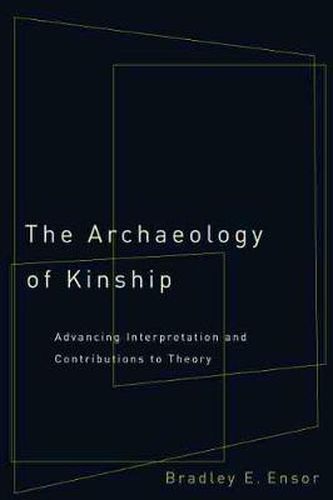Readings Newsletter
Become a Readings Member to make your shopping experience even easier.
Sign in or sign up for free!
You’re not far away from qualifying for FREE standard shipping within Australia
You’ve qualified for FREE standard shipping within Australia
The cart is loading…






Archaeology has been subjected to a wide range of misunderstandings of kinship theory and many of its central concepts. Demonstrating that kinship is the foundation for past societies’ social organisation, particularly in non-state societies, Bradley E. Ensor offers a lucid presentation of kinship principles and theories accessible to a broad audience. He provides not only descriptions of what the principles entail but also an understanding of their relevance to past and present topics of interest to archaeologists. His overall goal is always clear: to illustrate how kinship analysis can advance archaeological interpretation and how archaeology can advance kinship theory.
The Archaeology of Kinship supports Ensor’s objectives: to demonstrate the relevance of kinship to major archaeological questions, to describe archaeological methods for kinship analysis independent of ethnological interpretation, to illustrate the use of those techniques with a case study, and to provide specific examples of how diachronic analyses address broader theory. As Ensor shows, archaeological diachronic analyses of kinship are independently possible, necessary, and capable of providing new insights into past cultures and broader anthropological theory. Although it is an old subject in anthropology, The Archaeology of Kinship can offer new and exciting frontiers for inquiry.
Kinship research in general-and prehistoric kinship in particular-is rapidly re-emerging as a topical subject in anthropology. This book is a timely archaeological contribution to that growing literature otherwise dominated by ethnology.
$9.00 standard shipping within Australia
FREE standard shipping within Australia for orders over $100.00
Express & International shipping calculated at checkout
Archaeology has been subjected to a wide range of misunderstandings of kinship theory and many of its central concepts. Demonstrating that kinship is the foundation for past societies’ social organisation, particularly in non-state societies, Bradley E. Ensor offers a lucid presentation of kinship principles and theories accessible to a broad audience. He provides not only descriptions of what the principles entail but also an understanding of their relevance to past and present topics of interest to archaeologists. His overall goal is always clear: to illustrate how kinship analysis can advance archaeological interpretation and how archaeology can advance kinship theory.
The Archaeology of Kinship supports Ensor’s objectives: to demonstrate the relevance of kinship to major archaeological questions, to describe archaeological methods for kinship analysis independent of ethnological interpretation, to illustrate the use of those techniques with a case study, and to provide specific examples of how diachronic analyses address broader theory. As Ensor shows, archaeological diachronic analyses of kinship are independently possible, necessary, and capable of providing new insights into past cultures and broader anthropological theory. Although it is an old subject in anthropology, The Archaeology of Kinship can offer new and exciting frontiers for inquiry.
Kinship research in general-and prehistoric kinship in particular-is rapidly re-emerging as a topical subject in anthropology. This book is a timely archaeological contribution to that growing literature otherwise dominated by ethnology.